
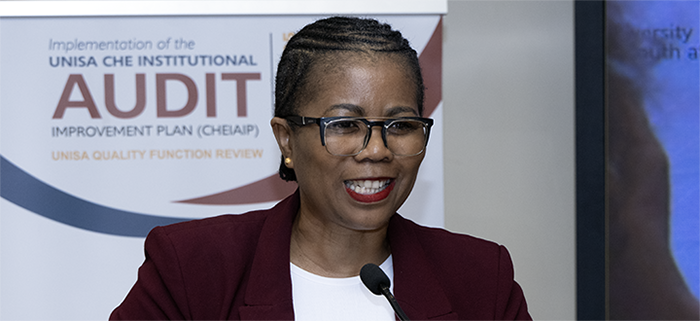
Prof Puleng LenkaBula, Unisa Principal and Vice-Chancellor
Themed Affirming Unisa’s CODeL+ identity and research-led university, Unisa hosted a symposium on 1 and 2 September 2025, focused on understanding and catapulting the notion of a research-led university, centred on open distance e-learning (ODeL) and student support in the ever-evolving teaching and learning space, driven by student-centric and technological approaches. The programme was directed by eminent Professor Extraordinaire, Moeketsi Letseka.
In her opening remarks, Unisa’s Principal and Vice-Chancellor (VC), Prof Puleng LenkaBula, emphasised that Unisa must continue to re-evaluate and reposition its trajectory. She highlighted: "As Africans, I implore everyone to become ardent advocates for justice, whether by combatting social ills such as economic injustice, environmental degradation, unemployment, access to higher learning, and the scourge of gender-based violence and femicide."
Continuing, the VC remarked that Unisa’s open distance educational quality offering must continue to offer solutions that directly confront Africa’s challenges, including development, infrastructure and inequality. Further, she noted that education must continue to be transformative and empower societies towards reclaiming the future.
The VC also noted that while Unisa continues to provide excellent education, "the university constantly revises, restructures, and realigns its trajectories to not only uphold its legislative mandate, but to also persistently lead in research, innovation, engaged scholarship and its scientific agenda. We also need to ensure that we do not lose our competitive edge in the global knowledge arena."
Furthermore, LenkaBula upheld that Unisa must continue ascending the global stature, maintain its global rankings, and provide the working class, professionals, young and first-time university entrants with relevant education. She also emphasised the need to ensure that the university’s tools of education delivery are accessible and honed at enabling student’s success, including dedicating resources specific to students with disabilities.
The VC also remarked that the university has concluded the revision of its 2021-2025 Strategic Plan, which, she said, includes mandates driven by singular overarching imperatives to recentre Unisa’s core strategy on catapulting the university as a pioneer in higher education, particularly in ODeL. She added: "This vision is brought to live through the intentional development and implementation of the catalytic niche areas, and being aware of our mandate to serve students as our key stakeholders, through placing their success at the centre of every decision making."
Dr Matsheliso Molapo, Acting Vice-Principal of Strategy, Risk and Advisory Services, detailed the university’s history timeline to its current state. She emphasised that ODL must lead the digital arena in the provision of quality education, that it must remain innovative, inclusive, flexible, adaptive and user-friendly.
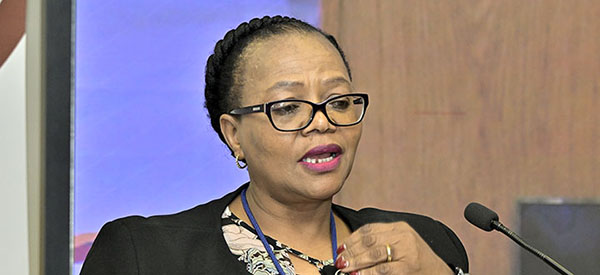
Dr Matsheliso Molapo, Acting Vice-Principal: Strategy, Risk and Advisory Services
Continuing, Molapo said that these areas position the university as a central agent in democratising access to education for the South African youth and to cultivate a robust system for lifelong learning among adults that wish to further their studies. "Unisa has risen to this challenge, emerging as a paramount institution that produces nearly half of the country’s graduates."
Additionally, Molapo emphasised that the university’s strategic pillars embody the core mandates of the university’s existence aligned with legislation, the National Development Plan 2030, the Africa Agenda’s 2063 aspirations, transformation and societal needs. She affirmed that the pillars ensure that Unisa remains relevant, responsive and committed to providing quality education that is not only on par with global standards, but also actively attuned to contributing to and addressing the needs and challenges faced by South Africa and the continent.
President of Unisa’s National Student Representative Council, Nkosinathi Mabilane, hailed Unisa as a university committed to transforming the lives of South Africans and Africans at large, regardless of their socio-economic circumstances. "Also, Unisa offers accessible education to those who wish to progress to a brighter future, providing them with the necessary tools to achieve their aspiration and thrive in the modern digital arena."
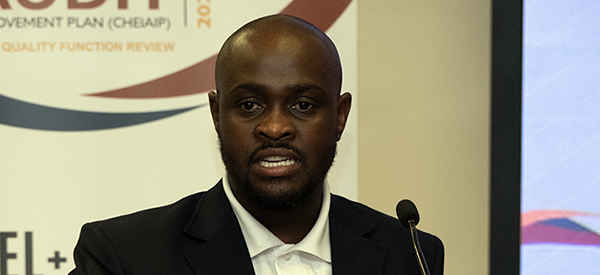
Nkosinathi Mabilane, President of Unisa’s National Student Representative Council
Continuing, Mabilane stated that Unisa continues to be responsible for a large portion of student intake in the country, acknowledging that some of the university’s students are counted among the unemployed, faced with socio-economic setbacks, yet they refuse to give up on their academic pursuits.
Mabilane further applauded the university for ensuring the provision of cellphone network data, learning infrastructure and the necessary digital tools in ensuring that student success remains a priority, and that barriers to e-learning are addressed effectively.
Prof Peter Scott, President and Chief Executive Officer of the Commonwealth of Learning, observed that geopolitics, climate change, demographic shifts, economic instability and rapid technological innovation, among other facets, continuously shape the higher education landscape, particularly the ODeL space. "Therefore," he emphasised, "agility, adaptability and technology-driven pathways are non-negotiable, especially for Unisa, for its students to access e-learning despite their locations."
Delving deeper, Scott noted that there is a growing global demand for lifelong learning as individuals recognise the need to update their skills in an economy driven by innovation and automation. Additionally, Scott said that considering the unemployment rate in South Africa, "universities are compelled to align their curricula with the ever-evolving needs of the rapidly changing labour market". He also called for increased accessibility and equitable inclusivity, which should prioritise dismantling digital divide, especially in the Global South.
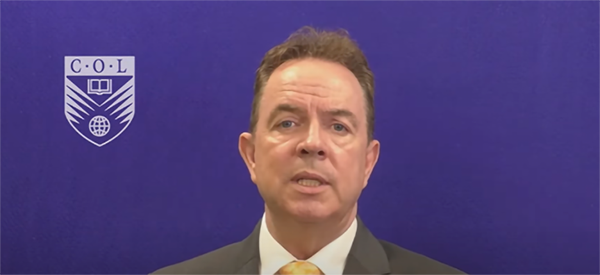
Prof Peter Scott, President and Chief Executive Officer of the Commonwealth of Learning
Moreover, Scott emphasised that ODeL ought to encompass a spectrum of approaches that combine principles of openness, remove barriers to entry, and it should incorporate real-time, on-demand and flexible technologies. "Unisa has demonstrated its ability to upholding these principles through cost-effectiveness, technology-led innovation and student-centredness, among others."
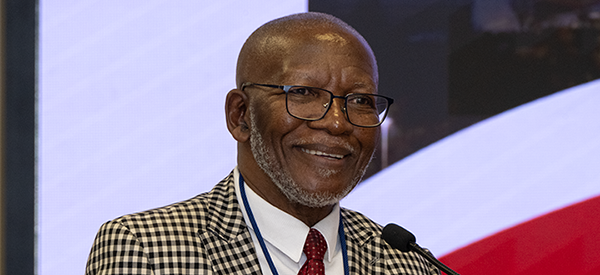
Programme director: Prof Extraordinaire, Moeketsi Letseka
The event continued with experts giving analysis and tabling scenarios on the robustness and areas of improvement within the ODeL spectrum. The experts included Dr Godson Gatsha, Deputy Vice-Chancellor of Student Services at the Botswana Open University, Dr Jenny Glennie, Founding Director of the South African Institute for Open Learning, and Dr Ngepathimo Kadhila, Chief Executive Officer of the Namibian College of Open Learning.
*By Godfrey Madibane, Acting Journalist, Department of Institutional Advancement
**Photography by Shooheima Champion, Unisa’s Multimedia Centre
Publish date: 2025-09-15 00:00:00.0
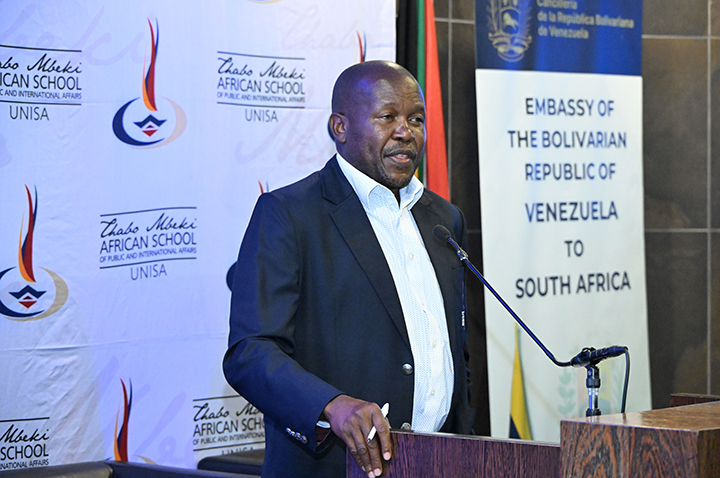 Unisa seminar examines breach of the international legal framework
Unisa seminar examines breach of the international legal framework
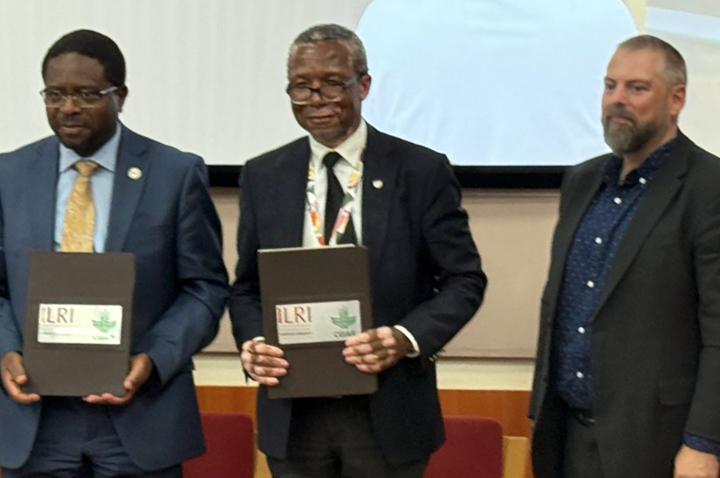 Unisa and ILRI sign landmark MoU to advance Africa's genomic leadership
Unisa and ILRI sign landmark MoU to advance Africa's genomic leadership
 AMT to strengthen global black hole imaging and advance African astrophysics
AMT to strengthen global black hole imaging and advance African astrophysics
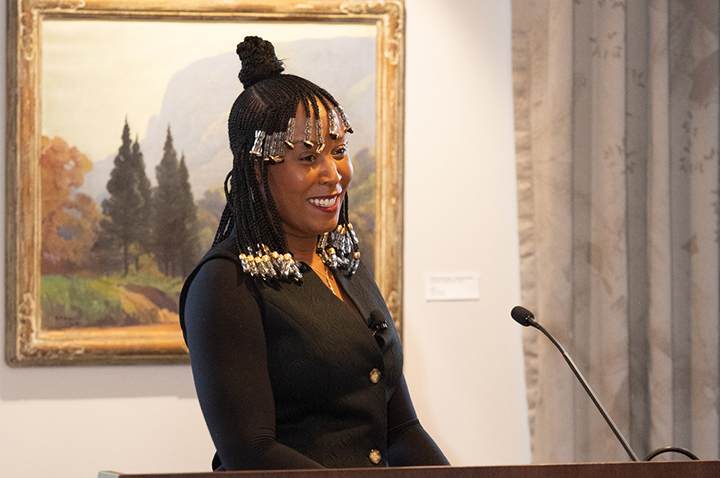 Unisan awarded Presidential Fellowship at American university
Unisan awarded Presidential Fellowship at American university
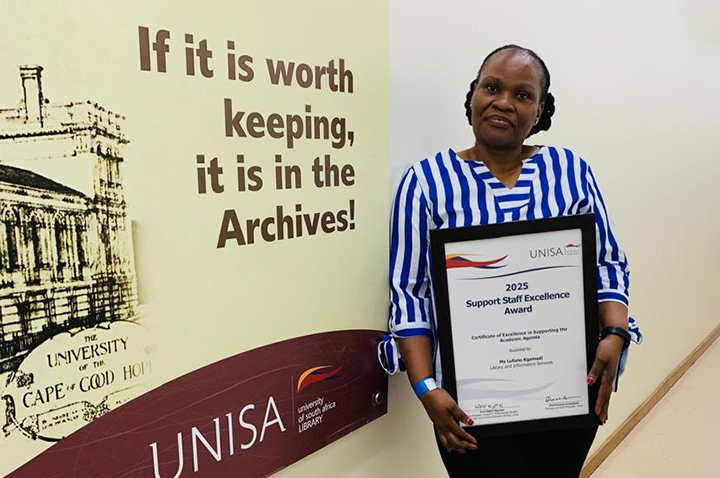 Scholar-practitioner excellence recognised at Unisa
Scholar-practitioner excellence recognised at Unisa